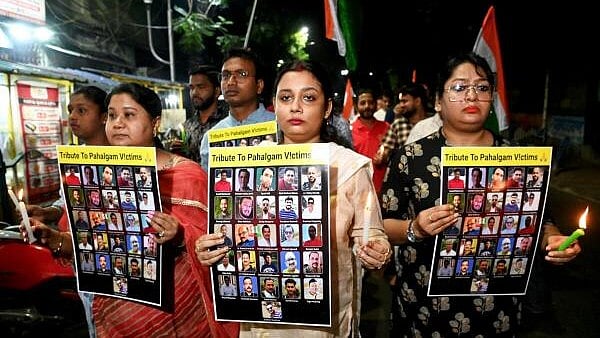
Women participate in a candlelight vigil to protest against the Pahalgam terror attack, in Kolkata.
Credit: PTI Photo
Given the enormity of the April 22 attack on tourists in Kashmir’s Pahalgam, it is not unusual that there will be strident calls for retaliation against Pakistan. This is more so when the perpetrators of the attack selectively targeted Hindus, and reportedly engaged in a communal diatribe.
While the Government of India must deal with Pakistan with the seriousness the terror strike warrants, there has to be effective political and civil society articulation and action to prevent heightened public sentiment from coalescing into anger and retribution against Kashmiris and other Muslims unrelated to the crime, which stands to fulfil the terror endgame of pushing India into an internal strife.
Any Kashmiri living anywhere in India has a non-negotiable right to dignity and physical safety. Dignity includes the pre-condition that there wouldn't be adverse public sentiment putting onus on them to explain or atone for terror incidents taking place in their home state. They are the worst victims of it. A Kashmiri studying in an Indian university is neither responsible nor answerable for the blood let-out in Pahalgam.
It is appalling that there is an environment today where every Muslim, and more so a Kashmiri, is a suspect and must atone for real and imagined excesses in history and current disturbances. Targeting a Kashmiri or any Muslim is easy today, for there is an accompanying sense of impunity, which draws from uncouched communal discourse we have normalised in our various environments, including cinema, television, and even RWA WhatsApp groups. There have been enough spontaneous expressions of grief and solidarity from all sections of Kashmiris. A Kashmiri pony-ride operator laid out his life to save tourists.
If there is anyone who is answerable for the security lapses leading to the attack, it is the government, precisely the Lieutenant Governor who has created a parallel executive structure whose writ runs above Jammu and Kashmir’s elected government making mockery of India’s federal arrangement, and the Union home minister whose party, the Bharatiya Janata Party (BJP)’s selling point in election after election is a fabled normalcy in Kashmir. But seeking accountability from the Narendra Modi government today, particularly in matters related to security, is viewed as collusion with the enemy, or an attempt to impair unity.
That brings us to the other important aspect: Unity. When terror strikes, people must rise above political and ideological affiliations. But unity cannot be unanimity with the political discourse of the ruling party, and the absence of accountability-seeking. What transpired after the Pulwama terror strike was an animating expositions of nationalism, amply aiding the BJP’s national election campaign, while questions related to procurement, hoarding and transportation of RDX of a massive quantity were dismissed as an attempt to amplify the anti-India message of Pakistan. That must not repeat.
A vortex of untempered public emotions in the aftermath of terror is normal, but such emotions determining the course of a nation’s response to terror can be dangerous. It leads to the generation of a pessimistic political energy finding easy prey, when ideally it should nudge the government to critically examine its architecture to handle terror which in the case of Kashmir cannot be delinked to the broader political context as the late Prime Minister Atal Bihari Vajpayee understood.
It was Vajpayee’s and then Jammu and Kashmir Chief Minister Mufti Mohammad Sayeed’s acknowledgement of various dimensions of the Kashmir conflict and engagement with various stakeholders that helped ebb local support to militancy and created potential for peace. The number of militants killed dropped from 2,850 in 2001 to 84 in 2012 which attests to the effectiveness of Vajpayee-Sayeed strategy.
The current dispensation has jettisoned meaningful deliberations with multiple stakeholders. It also regularly affirms the superior virtue of strong-arm handling of conflict. When Home Minister Amit Shah visited Srinagar earlier this month to review the security situation, he did not invite Chief Minister Omar Abdullah or any of his ministers. Abdullah’s and other regional leaders’ perspectives are important in understanding various psyches at play in a conflict region, especially the recurring targeted killings , which emerged as a distinct feature of terror in post-370 Kashmir.
Interactions with Kashmir’s several leaders and academics underscore that there are deep-rooted apprehensions regarding demographic re-orientation in Kashmir. Are targeted killings a fallout of that? On April 9, it was reported that more than 83,000 domicile certificates were issued to non-locals in the past two years.
What strategy does the Government of India have in its armoury to contain lone-wolf attacks on non-locals? While a retaliatory one-time ambush sufficiently assuages public anger, the government ought to do multi-stakeholder-based deliberation on building a long-term deterrent. But the BJP has trapped itself in a unidimensional rhetoric which sees Kashmir as a lost Hindu heritage to be reclaimed.
(Anando Bhakto is a New Delhi-based journalist with over a decade’s experience covering Kashmir.)
Disclaimer: The views expressed above are the author's own. They do not necessarily reflect the views of DH.